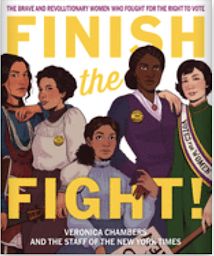After reading Stamped: Racism, Antiracism and You by Jason Reynolds and Ibram Kendi realized how much I don't know about history. So, I set out to learn more. Early this summer I picked up the book Lifting as We Climb: Black Women's Battle for the Ballot Box by Evette Dionne thinking it would be a quick read. It is not long and meant for middle grade/middle school.
I thought I knew a lot about women's rights but realized immediately that this was not going to be a quick read. I realized that what I knew was VERY limited and that there were so many women whose work I did not know.
And then I started seeing so much about the 100th Anniversary of women's right to vote and so much of it left out the important fact that not all women were given the right to vote at that time. The fight for voting rights was not over.
I don't know enough about this but I know that there is a lot I have to learn. So, I decided I had to build my own text set and approach this a little differently. I needed a bit more background knowledge, some highlighters and lots of pieces to read and build understanding over time.
One thing I have learned is that when I build a text set for myself, it also works well in the classroom and when I am working with teachers to plan. When I learn, I have better resources to share with students. And I must admit that so much of what I learn about history lately is from incredible books written for children. These are the kind of text sets we need to build--for ourselves AND for our students.
There aren't a lot of books out there about people other than those we hear about often in the fight for women's right to vote. But there are several.
None of these books have all of the info or all of the voices so I will have to be a critical reader, asking myself these questions as I go. I need to really think about what is missing and who is included in each of these books. And I won't be finished learning when I finish this text set. It will be only the beginning but I am hoping it builds enough background knowledge for me to have a better sense of history.
Maybe if we build text sets like these, students today won't have to unlearn and relearn history the way that I have had to.
Here are the books I plan to read over the next several weeks or months. And then I'll go back to Lifting as We Climb.
Equality's Call: The Story of Voting Rights in America by Deborah Diesen
This picture book explains the sequence of the fight for voter's rights and that it is continued work. The simple text is great to show the events and battles fought for voter rights and there is information at the end of the book that adds more.
Finish the Fight: The Brave and Revolutionary Women Who Fought for the Right to Vote by Veronica Chambers and the Staff at the New York Times is a 100-page book that is told in narrative. The book begins with the words..."Here are some suffragists you may have learned about..." (above images of Susan B. Anthony, Elizabeth Cady Stanton and other white women). "...but there are lots more you should know!" above images of a much larger number of women who were part of this fight. This book is filled with information, artifacts and photos and is written for middle grade/middle school readers.
History Smashers: Women's Right to Vote by Kate Messner
If you don't know this new series by Kate Messner, it is a great series for middle grade, middle school and anyone who is relearning so much history. This one on the Women's Right to Vote is an important one for this topic. These books are chapter book length (about 200 pages) and filled with information that we may not have learned. There are also many great resources that can be explore independently after reading. The tone of this series is conversational and accessible.
Voice of Freedom: Frannie Lou Hamer: The Spirit of the Civil Rights Movement by Carole Boston Weatherford is a picture book biography. I am truly alarmed at how few picture books are out there about BIPOC women civil rights activists. And even few specific to women's right to vote. This one is a great one and I hope we get more published about important BIPOC women.
Ida B. Wells: Let the Truth Be Told by Walter Dean Myers is a picture book biography that tells about Ida B. Wells' life as an activist. Although this book doesn't focus solely on the women's right to vote, it does include many of the causes Wells fought for as well as events in her personal life.
How Women Won the Vote by Susan Campbell Bartoletti
This book focuses on the part of the story we know best but it does include information on the discrimination women of color faced in this fight. The way this is embedded in the story is helpful to understand the way the events played out. This book includes photos from the events from history.
There are several good online resources that have been published recently so I started a Padlet for myself (and whoever else is interested) with recent publications on the topic. Teen Vogue is a great source for relearning history so there are some articles from that publication. I have also found some podcasts, etc. that look promising. I'll keep adding resources. I am looking specifically for the pieces of this story that I don't know, people who I haven't learned about.








































